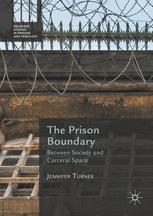

Most ebook files are in PDF format, so you can easily read them using various software such as Foxit Reader or directly on the Google Chrome browser.
Some ebook files are released by publishers in other formats such as .awz, .mobi, .epub, .fb2, etc. You may need to install specific software to read these formats on mobile/PC, such as Calibre.
Please read the tutorial at this link. https://ebooknice.com/page/post?id=faq
We offer FREE conversion to the popular formats you request; however, this may take some time. Therefore, right after payment, please email us, and we will try to provide the service as quickly as possible.
For some exceptional file formats or broken links (if any), please refrain from opening any disputes. Instead, email us first, and we will try to assist within a maximum of 6 hours.
EbookNice Team

Status:
Available4.5
41 reviewsThis book explores the idea of the prison boundary, identifying where it is located, which processes and performances help construct and animate it, and who takes part in them. Although the relationship between prison and non-prison has garnered academic interest from various disciplines in the last decade, the cultural performance of the boundary has been largely ignored. This book adds to the field by exploring the complexity of the material and symbolic connections that exist between society and carceral space.
Drawing on a range of cultural examples including governmental legislation, penal tourism, prisoner work programmes and art by offenders, Jennifer Turner attends to the everyday, practised manifestations and negotiations of the prison boundary. The book reveals how prisoners actively engage with life outside of prison and how members of the public may cross the boundary to the inside. In doing so, it shows the prison boundary to be a complex patchwork of processes, people and parts. The book will be of great interest to scholars and upper-level students of criminology, carceral geography and cultural studies.